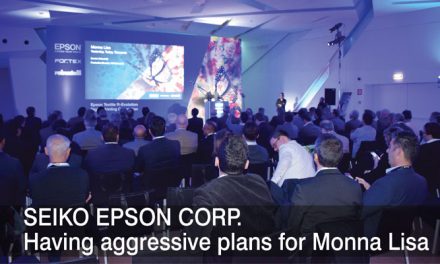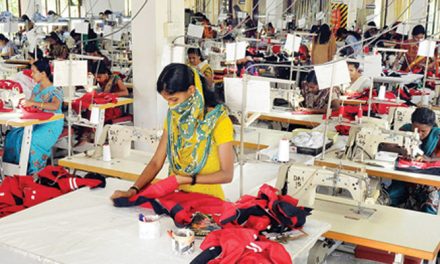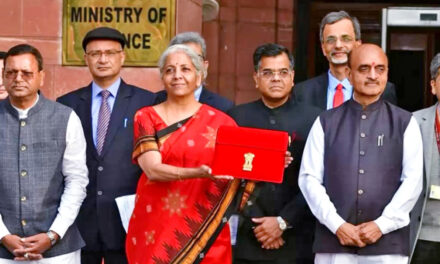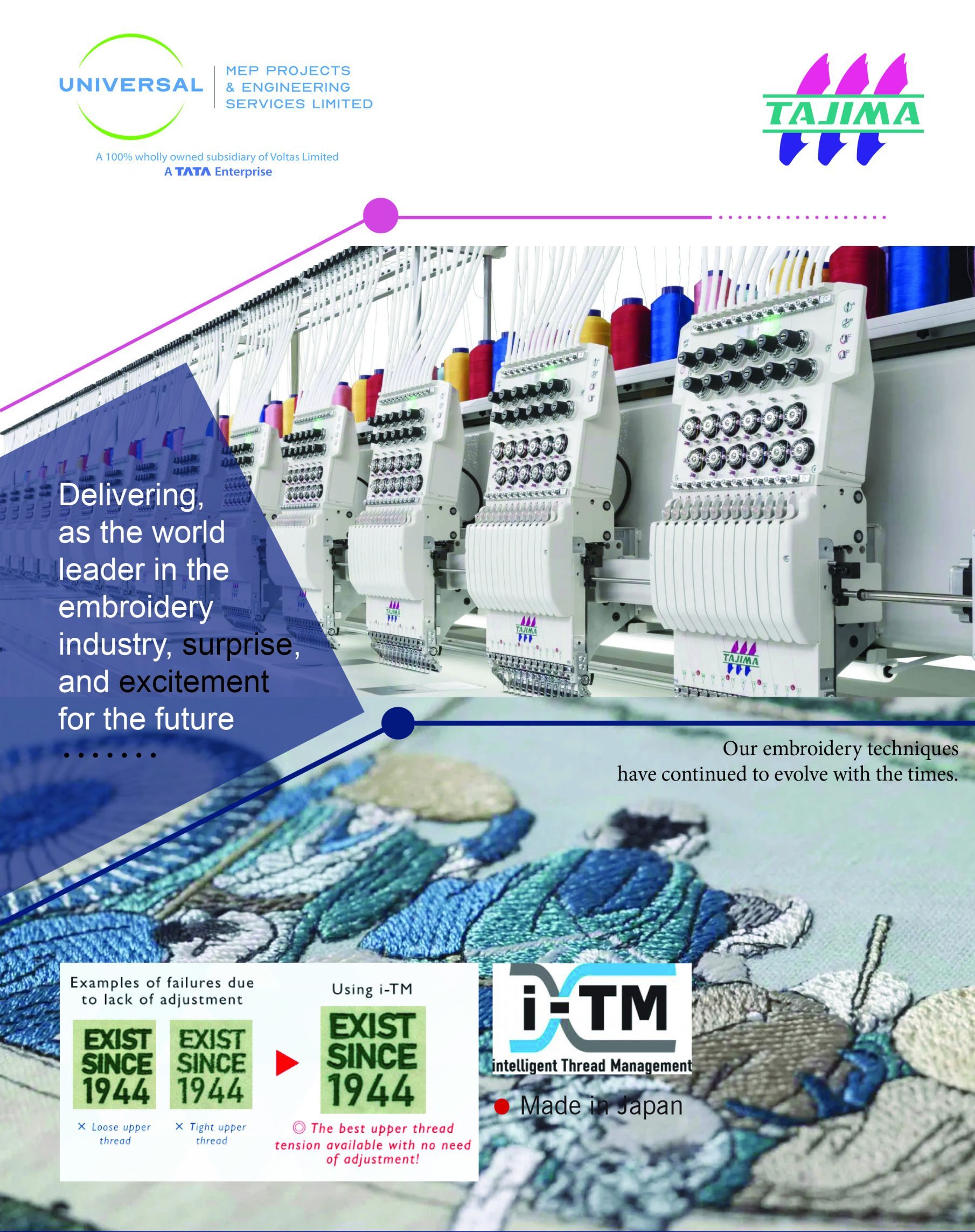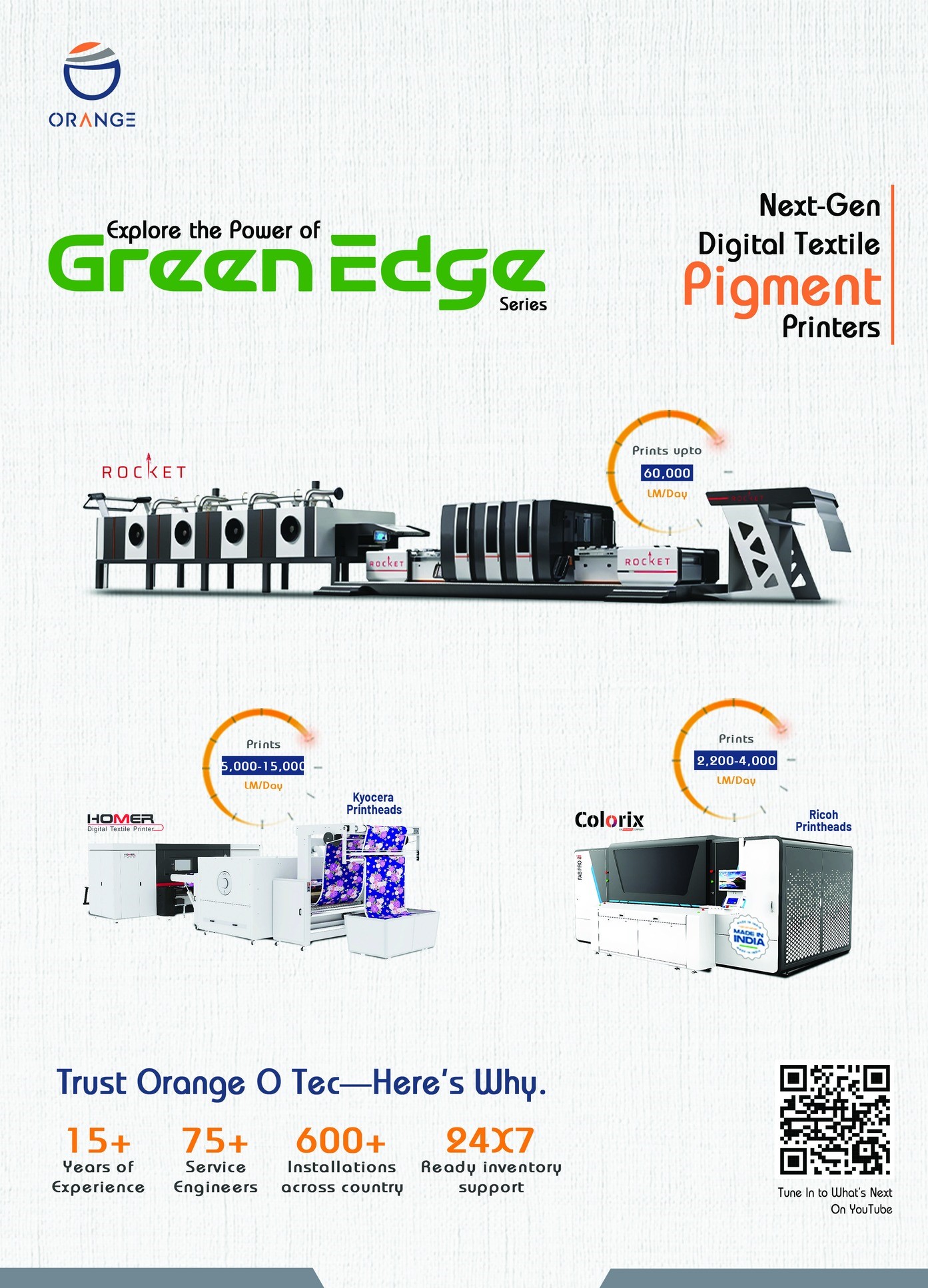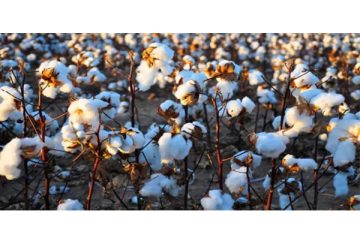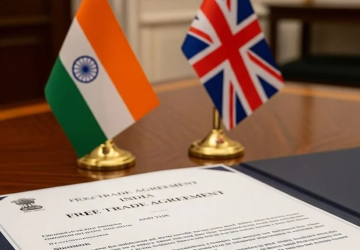
The denim market in India is expected to reach $9.15 billion by 2026, up from $6.15 billion in FY2023, and is expanding at an outstanding average annual growth rate of 8 to 9%. The country has the second-largest installed denim fabric capacity in the world, with around 1,600 million meters.
Denim is consumed domestically to the tune of one billion meters, while the remainder is exported. It is projected that India’s denim exports will reach 650–700 million meters by 2027. After China and Pakistan, India is the world’s third-largest exporter of denim fabric, with an 11% market share.
By 2027, the global market is anticipated to increase at a 4.7% CAGR to reach US$ 87.4 billion. Although this figure is unimpressive, the Indian denim market is not in the same boat. The Indian denim market is projected to reach approximately Rs. 91,894 crores by 2028 at a current 8%–9% CAGR. Despite the global slowdown, the domestic market is expected to have strong demand for the next quarter due to its own CAGR, which is higher than the worldwide average.
The denim industry is incredibly dynamic and adaptable. Because denim never goes out of fashion, it is always in demand. The denim market frequently sees new trends and innovations in order to meet the everincreasing demand. Nowadays, they want denim that is flexible, light, soft, recycled, and viscose-blended. Compared to ordinary denim, viscose and spandex-mix denim is softer and more comfy. The end result is a more lightweight, comfortable, and stylish item that may be worn every day.
There is a growing demand for sustainable and environmentally friendly fabric. The real challenge for the domestic manufacturers is to adopt new technologies and use sustainable raw materials while making sure that the final product is somewhat affordable. Sustainability initiatives, such as the Better Cotton Initiative (BCI) and Zero Discharge of Hazardous Chemicals (ZDHC), are promoting eco-friendly practices throughout the denim supply chain. The recycled denim market is still at the nascent stage. R&D and investments are required to further develop the sustainable and recycled denim market.
The Indian denim business has enormous potential to grow. There are a few things that prevent its expansion, though. For the Indian denim sector, the two biggest problems are the price volatility of raw materials and the reliance on Chinese suppliers. There is a substantial import tax on certain basic commodities. Domestic cotton is more expensive than imported cotton. Further, due to supply chain disruptions, higher import taxes, and crises like the war between Russia – Ukraine and Israel and Palestine/Iran, the Indian textile industry has suffered greatly. As a result, demand has been muted in FY23. The government needs to consider devising and implementing a Cotton Price Stabilisation Fund Scheme to stabilise domestic cotton prices.
Conclusion
The Indian textile industry is now on the road to recovery and is expected to bounce back in the near future. With the US and European countries now eyeing other Asian countries to meet their demands, this policy could be a blessing in disguise for India. The denim industry exemplifies resilience, adaptability, and cultural relevance. As sustainability, technology, and fashion trends reshape the sector, denim continues to evolve while maintaining its iconic status. With expanding markets, innovative designs, and a focus on reducing its environmental impact, denim remains a cornerstone of the global fashion landscape. The industry’s future is bright, driven by creativity, sustainability, and a universal love for this timeless fabric.


Chandrakant Huddar
Director-Sales & Marketing Raymond UCO Denim Pvt. Ltd.
Raymond’s passion for denim started in 1996 with a stateof-the-art denim fabric manufacturing facility in collaboration with an Italian denim major. In 2006, Raymond entered into a joint venture with Belgian denim major UCO NV with a vision to mark worldwide presence. Spread over 169 acres, the denim fabric manufacturing facility is strategically located in the heart of the cotton belt in India – a city named Yavatmal. With fabric manufacturing capacity of up to 44 million meters per annum and 2.75 million pieces per annum of denim garments, this facility today has turned out to be one of the most versatile, flexible, and vertically integrated denim manufacturing facilities in India. We were working with all the major national and international brands. Today we export around 30 to 40 percent; the rest is to different jeans brands, and some quantity goes to the dealer network all over India.
Now, everybody is talking about sustainability. We are already doing sustainable products with many European brands for the last few years, like using post-consumer waste and new fibre blends like Tencel and modal, and dyeing technologies where less water is used. Our factory itself is a zerodischarge factory with bio-affluent treatment, where no chemicals are used. So, it’s a green factory having more than 80,000 trees.

PK Acharya
Sr.President
Siyaram Silk Mill Limited
Siyaram Silk Mill Limited was established in 1978. We are having a turnover of 2200 cr per annum. In this company we have started knitted denim fabric only 2 years ago. The DEN-KNIT is the 21st-century fabric that’s here to redefine the fashion industry. It’s a fabric combining the appearance of woven denim with the knitted structures made by interloops that can be stretched 360 degrees, 4 ways, and that’s the best part about it.
It is very comfortable and very innovative fabric, and we have gotten a very good response in the market. Actually, Siyaram Silk Mill has almost 12 brands. We are catering to suiting, shirting, and garments in large quantities. We are the number one brand in India. We have a production capacity of 75,00,000 meters per month in-house for PV suiting and 25,00,000 meters of shirting that we are catering to all over India and mainly exporting to Europe and America.
We don’t have any expansion plan right now. Over the years, denim production capacity increased a lot in India. The export of denim is almost down by 50%. This is due to a lack of demand in America and Europe. That has put pressure on the denim industry in India.
As far as sustainability is concerned, we have zero liquid discharge in both the process house, one in Tarapur and in Amravati also. We have also planted 2000 trees in our plant recently, so it is a green environment. We are going for solar energy in all our plants. So that is also a step towards sustainability.

Shiv Mangla
GM (Sales & Marketing) Nandan Denim Limited
Nandan Denim is a part of the Chiripal Group. Our company started in 2005. We are in the denim manufacturing business, and we are making fabrics starting from three ounces to up to 14 ounces. We are making all types of weaves, like three by one, two by one, and knit fabric. All types of indigos, sustainable fabrics, recycled fabrics, and all kinds of shades and coating fabrics – are our specialities.
Our capacity is 45 lakh meters per month. Our export percentage is approximately 40 percent. We are exporting to Bangladesh, Peru, Latin America, and Sri Lanka. In domestic brands we are working with Myntra, Fipkart, Reliance, Zudio, MAX, Easybuy, and Lifestyle.
Currently, the denim industry is about three by one fabric. In three by one, there are different shades and coating fabrics, and somewhere the recycled fabrics. Fabrics made by recycling PET bottles are also slowly becoming a trend.
The government should increase some subsidies for its textile industry. The textile industry is the biggest employer; if we talk about agriculture, thereafter it is the textile industry that provides maximum employment. The Indian textile industry is facing very tough competition with countries like China; for this we need some support from the government, like on subsidies and import duties.
This time is tough for the denim industry. But there is a lot of potential in the denim industry. Now denim has progressed from tier one to tier two and tier three. Even now, if you look at it mainly in the villages of India, denim has not reached much there. So even now there is a lot of potential in India where you can explore your denim, because denim is a fabric that is very cheap, long-lasting, easy to wear, and easy to wash, meaning you can wear it for a long time. So according to this, the consumption of denim should be increased.

Vishal Joshi
General Manager
Vishal Fabrics Ltd
Vishal Fabrics was started in the year 2016. Vishal Fabrics is the second-largest company in the denim industry. Our production capacity is 40 lakh meters per month. Vishal Fabrics Limited is a reputed entity that is known for dyeing, printing, and processing denim and other wide ranges of fabrics. The fabric composition consists of 100% cotton, cotton spandex, cottonpoly, cotton-poly spandex, cotton modal, and cotton tencel. Along with that, Vishal Fabrics Limited is a premier supplier of top-quality stretch denim fabric, which is very popular among people of all ages. We export as well as supply to all major brands in India.
We have created many new products in cotton knits, like stretch fabric of 64, 72, and 74 widths. There are different finishes in it; there is overdyed fabric, which we have made by adding slub. From shirting too, we have a wide variety available for women’s wear and men’s wear for bottoms and shirting. We have recently introduced pre-wash denim fabric, which you do not need to wash; just stitch it and wear it. All these products are getting a good response in the market.
Our main focus is on domestic markets and brands. We have just recently focused on export and started exporting to Bangladesh and Sri Lanka. So right now our export percentage is only 20-25 percent.
The government should give some benefits to the textile industry, just as it is making efforts for all the other industries. The denim sector has always been evergreen because everyone wears it, be it the young generation or the old generation. Denim is going to continue to grow in futures. But if the government does something for the denim industry, then it will grow faster.

Suketu Shah
Chief Executive & Business Head
RSWM Limited, LNJ Denim
LNJ Denim, a denim-manufacturing facility established in 2007 under RSWM Limited (the flagship company of the LNJ Bhilwara Group), has a manufacturing capacity of 33 million meters annually. LNJ Denim has earned an excellent reputation amongst international and domestic brands as an innovator and a quality supplier of denim fabric.
We are a niche player in the market with the top edge products, not like a bulk producer of the fabric, but with the differentiated products. And we deal mostly with the brands and the trade segment as well as the export segment. The brands we work with are Levi’s, Levi’s India, Killer, Pepe, Numero Uno, Mufti, Spyker, Arvind, US Polo, Aditya Birla, Blackberry, and United Colours of Benetton. Other than that, there is a lot of domestic trade, which also deals with a lot of second-level brands in the market. Overall, we share a good repo at the marketplace as far as LNJ Denim is concerned.
LNJ Denim export is 35%. We are exporting to Latin American brands, US brands, as well as Korean brands. We also export to Bangladesh, who does the garmenting and supplies to Europe and US markets. We expanded our denim capacity by one line, which is 8 mn meters, in the year 2021. So, right now, we are contemplating utilising that only because the last two years were very tough for the denim market.
Denim is always growing. It’s around a 7 to 8% CAGR; it grows every year; ups and downs are always there in the denim. So, you have to live with it. We have already discussed the problems with the textile minister, and he was very positive about the steps to be taken for the denim fraternity. And we hope that he will be able to help us in the future.
We always believe in new development and sustainable products. We proudly offer recycled denim products in both rigid and stretch constructions. Our state-ofthe-art Garnett machines efficiently break down post-consumer waste fabrics and convert them into new usable fibres – we’re weaving new denim while eliminating excess waste from landfills. We also offer fabrics dyed with advanced techniques that use less water and fewer chemicals. To round out our efforts, we treat all of our post-process water in our own effluent treatment plant and further purify it via reverse osmosis before returning it to the environment cleaner than before. This is what the eco denim range is that we have introduced recently.

Aditya Goyal
Managing Director
Anubha Industries
Anubha Industries is a 10-year-old company now in the trade. We have one of the most diverse product portfolios among all the denim mills in the country. We offer products ranging from lightweight to heavyweight categories, including both denim and non-denim materials. When we started, we were the first company that was producing both non-denim and denim in the same facility.
Gradually now, a lot of other companies are also trying to catch up on this trend, looking into the volatility of the denim business as well as the demand for various types of colours that are coming in this current season or for the last two seasons, and that seems to be the flavour for the next couple of seasons also. So people are realising that relying on one particular type of product group might be challenging. So that has been one of our core USPs, one of our strengths, and we have continued to improve upon our product deliverables based on our philosophy.
We produce close to 2 crore meters a year. We do between 15 and 18 lakh meters a month, and we are very happy doing that. No, we are not expanding; we are debottlenecking, and we are improving our product capabilities rather than just expanding upon volume. We believe very strongly in the core philosophy of sustainability and ethical production, and increasing output by itself does not make sense in today’s environment. Out of total production 50% goes to exports, and 50% goes to domestic brands and retailers. We are working with each and every brand at the national level. Largely we export to converting countries like Bangladesh and Sri Lanka.
The new trend in denim right now in the Indian market is towards coloured denims, and in the international market, gradually now the entire trend is catching up towards recycled products, recycled yarn, and recycled denims. Definitely everyone wants an element of sustainability in their product mix. Some brands have matured to a level where they have been able to align and complete their entire supply chain to be able to offer a completely sustainable product or something that can be labelled as completely sustainable. Some brands are getting onto it because there is pressure from various legislations. They need to reduce their toxic footprint or their environmental footprint.
The denim industry is a never-ending journey. I mean, people want denim; the flavour of denim keeps on changing. Denim can no longer be classified as a pure indigo product. There have been now multiple iterations of denim, so automatically it can be challenging in certain phases, but I don’t think it is that there is some very adverse opinion or adverse scenario for the denim industry on the whole.

Pankaj Singh
Vice President, Denim
Ginni International Limited
Ginni is a high-quality producer of innovative denim fabric. The entire manufacturing process follows stringent stage-wise quality control methods with complete traceability from yarn to finished fabrics. The facility is equipped with a R&D lab for yarn inspection, a dyeing lab with online control of dyeing shed, and a physical lab for testing finished fabrics.
Ginni is a market leader in innovation, developing close to 100 products a month with different yarns, shades, and weaves. There is a dedicated product development cell with experienced technicians equipped with sampling, warping, dyeing, sizing, and loom facilities. The company has a network of consultants around the globe who are working in coordination with the product development cell to deliver continuously innovative products to the market. Our installed capacity is 27 million meters per annum.
We are doing around 20% export. At present, we do not have any plans for business expansion for the future. The current scenario of the Indian denim market is in an upward trend, as the retail market is very good during the festive season, and the coming few months will be very good. The future market for the denim industry will be very promising and expects good moves as cotton prices have been very stable for the last six months.
Recycle, BCI, organic, and multiblends (cotton/poly/viscose/Tencel/modal) with smooth hand-feel fabric are in trend. Multiblends fabric, old vintage looks in fashions, and very dark shade denim will be future trends. We are very much committed to sustainable products. We have a zero-discharge plant, a zero-carbon-emission boiler with biomass, waterless sulphur dyeing, using BCI, and organic and recycled yarn.

Subir Mukherjee
Business Head, Denim
Bhaskar Denim
Bhaskar Industries, is a Vertically Integrated Denim Mill under one roof, with an annual capacity of 44 million meters. Ever since our first loom kicked into action in the year 1998 – we have remained focused and responsive to the demands of the Jeans-Scape. Consistency in quality, timely delivery and keeping pace with the changing fashion trends has given us a desired position in the denim industry. With a strong product development team at the core and expertise of International designers, we are surging ahead with a basket of innovative products, to prime world markets in major garmenting centers.
We are very strong in it with Indian brands; we also export and the Indian trade segment. We do 3 mn meters per month. We are doing about 12 percent export but we also supply to garment exporters. Rest we are supplying to Indian domestic garment brands and trade channel. Every brand in India works with us. We are probably the largest player working with international brand segment like Levi’s, Lee, GAP and Wrangler. We also work with Indian brands like Killer, Spykar, Reliance and many other brands.
World fashion retail is slightly suppressed because of the economic situation and uncertainties. And Indian retail is also under pressure because of inflation. We hope this sector will go up. We have seen many ups and down in last 20 years. So has to come around; that is what we believe.
We have high expectations from the government and recently had productive meetings with the textile minister and textile secretary. We are seeking support to help textile mills survive in India. India has a strong cotton industry with a cotton surplus. However, the denim sector in India is underdeveloped in terms of garment manufacturing. We face stiff competition from Bangladesh, which has larger facilities. Transit times to Bangladesh are currently long and unpredictable due to border issues, often taking around 10 days. We are requesting the government to facilitate faster transit, aiming for a 3-4 day timeframe to improve our competitiveness.
Additionally, we have a treaty with Bangladesh that allows fabrics made in Bangladesh to be imported into India duty-free. While we support this, we urge the government to ensure that the origin of the fabric is clearly identified as either Bangladeshi or Indian to prevent Chinese-origin fabrics from entering through Bangladesh. Lastly, Indian cotton is relatively expensive compared to global markets. While this does not impact local retail, it affects our export competitiveness. We are requesting the government to provide a duty refund for Indian garment exporters to help offset this cost. If we import cotton, we should be eligible for a duty refund upon export.
To boost growth, we should encourage entrepreneurs from Bangladesh to invest in India. Despite the longer learning curve, their expertise could significantly benefit Indian textile mills and help expand the industry. We are always bringing something new. New structure, new colour is the focus. So we are creating new colours, and instead of yarn dyeing, we are doing different processes to create colors.

Deepak Gautam
Asst. General Manager (Mktg.)
Suryalakshmi Cotton Mills Ltd.
Suryalakshmi Cotton has started denim cloth manufacturing as a forward integration strategy; it conducts cutting-edge research to design, engineer, and produce speciality denim fabrics to meet the unique needs of global fashion markets. We have a state-of-the-art, fully integrated fabric manufacturing facility in Ramtek (Nagpur, Maharashtra). With an installed capacity of 40 million meters per annum, we enable one of the highest per meter sales price realisations in the industry. Our export percentage is approximately 50%. We export to Latin America, Bangladesh, Turkey, Sri Lanka, and many more countries. We are also doing business with national and international brands.
We custom-engineer a limitless combination of finish chemistries for diverse fabric needs. With the latest equipment for dyeing, weaving, and finishing, we have provided over 3,000 different varieties of speciality fabrics to customers across the globe. Our denim fabrics weigh from 5 oz to 15 oz, making them suitable for a wide variety of fashion wear. Our performance-orientated fabrics are specially designed keeping the end user in mind. Our ability to create custom designs and innovations provides an infinite range of possibilities for our customers. From light fabrics that are breathable & airy to a variety of denim blends that are meant to retain the shape and durability, our fabrics cater to diverse end-product needs.
Each and every product undergoes rugged tests and stringent quality procedures to ensure high-quality performance. With a commitment to sustainability, our products are created with a near-zero environmental impact, deploying safe & green technologies.
The textile industry is the secondlargest employment-generating sector after agriculture in India. The government has not given much for the textile industry in the last budget. The textile industry has been waiting for a long time for the government to take action. We are not getting much support from the government. We want the government to do something. The last 6 months have been very bad for the industry. This industry is not running in profit. Now for the last few months, people are a little hopeful about the future of business.
We are making new developments with Lyocell yarn and making the fabric. Normally, what people do is they put it in the warp directly, and we put it in the warp after dyeing it, so this is a new thing that we have done. Nowadays vintage denim is trending. In the last few years you have seen narrow fit, slim fit. Now boot cut or bell-bottom is in trend again. In vintage boot-cut, you don’t need much Lycra in the fabric. Now, non-Lycra jeans are back in trend, and everyone is asking for non-Lycra denim.
Right now we don’t have any future expansion plans because the current situation of the industry is not very good. This is a time of survival for the industry.

Vaibhav Jalan
Director
Sri Shyam Fashion India Pvt. Ltd.
Sri Shyam Fashion India Pvt. Ltd., the manufacturer of the SYAMA Denim brand, is a denim fabric mill that started its operations last year. Our production facility located in Gangad, Ahmedabad, is equipped with two indigo dyeing ranges along with a state-of-the-art dyeing, weaving, and processing setup. We focus primarily on producing premium-quality denims, offering a variety of weaves and speciality fabrics such as coated denim, RFDs, and sulphur & reactive denims.
We have established a strong marketing presence across major cities in India like Delhi, Mumbai, Bangalore, and Kolkata, supported by a comprehensive dealer network. Additionally, we have started exporting to neighbouring countries such as Bangladesh and Nepal. While exports are in their early stages, we are actively exploring opportunities in other markets. Our production capacity is around 2.5 million meters per month.
In recent trends, there’s growing demand for raw-wash & premium basic denims, often incorporating new weaves & blended fibers. New colour trends beyond indigos, like sandwich dyeing and sulphur-based coloured denims, are gaining popularity in the market, and we’re excited to cater to these evolving preferences.
Currently, growth in exports is limited due to ongoing geopolitical instability, particularly in key denim markets like Bangladesh. While domestic demand remains stable, the government should actively promote the garment industry by offering set-up incentives. For instance, many Indian brands are now sourcing garments from Bangladesh due to its competitive edge. Supporting local garment facilities could help bridge this gap and enhance India’s competitiveness in the global market.

Rajan Gupta
Marketing Head
Harman Denim
Harman is a forward-integrated group, having all in-house facilities like ginning, spinning, weaving, and garmenting, and was primarily known as Century Denim of the Aditya Birla Group. It has been taken over by Harman Group, i.e., a prominent name in the ginning industry called Manjeet Fibres. At the moment, our focus is mainly on the domestic market with different kinds of slubs, x-hatch under different weaves/colours in bottom weight in cotton/poly blends, as well as in 100 percent cotton products in multicounts/ring slubs, which are quite popular in the market as Harman slubs. We recently came out with a shirting collection comprising of basic, finecount, silky denims, slubs, x-hatch, and Tencel denims in different weights starting from 4 ozs to 8 ozs and are also in the process of introducing a few middle-weight denims for international buyers.
Our speciality is structured products, specialised slubs, and eco products with and without overdye. Our production capacity currently is around 6 lacs mtr, which we have been gearing up to make at least 10 lac mtr by the end of December this year and further reach the level of 15 lacs mtr by the end of March next year by increasing the number of looms. Presently the market conditions are okay, and we expect to have an improvement during the coming months when the actual main season starts.

Avinash Mane
Senior Commercial
Director AMEA & NEA
Lenzing Fibers India Pvt. Ltd.
The Indian denim industry has shifted its focus towards valueadded business models. This includes the adoption of in-house spinning capabilities for specialised fibres such as TENCEL™ and ECOVERO™ blends. This strategic move enhances the industry’s competitiveness and enables the production of high-quality denim products.
The denim industry’s future appears bright for businesses focusing on domestic markets. Increased demand at home suggests a promising shift in economic activity. Consumers are responding positively to new offerings from a variety of retailers. This surge in domestic interest creates exciting opportunities for growth and expansion. It’s clear that focusing on the domestic market is a strategic move for many businesses.
At Lenzing, we consistently provide denim manufacturers with exceptional supply chain solutions, ensuring that end buyers receive competitively priced products. We are pleased to introduce our latest offering, TENCEL™ lyocell Matte, a low-sheen fibre specifically designed for the men’s category.
Additionally, we provide eco-friendly colour technology options such as dope-dyed fibres like TENCEL™ Modal Black and Indigo, as well as ECOVERO™ black. Furthermore, we offer cross-linked fibres like TENCEL™ LF and A100 to effectively combat fibrillation and enhance colour vibrancy.
As an industry leader in fibre manufacturing, Lenzing prioritises sustainability as a core principle. Our comprehensive range of Lenzing fibres offers ideal solutions for denim mills, ensuring exceptional quality and environmental consciousness.

Ravi Shankar Sharma
Product Department, Denim
Sangam Denim
Sangam Denim is located in Rajasthan, Bhilwara. Sangam Denim is a large quality production division in denim products like cotton lycra, poly lycra, cotton knits, suiting, shirting, seamless garments, and men’s and women’s garments. Our current production capacity is 55 million meters, with 40% in exports. Our targets in domestic brands are like Lee Cooper, Reliance, MAX, and all other domestic brands and in global brands like Levi’s. We export to Bangladesh, Turkey, Latin America, Vietnam, and other countries too.
We are producing denim fabric from 4 oz. to 15 oz. using TFO, Eletwist, OE, Excel Linen, Tensile, Slubs, Rings, Ring Slub, Multi Count, Multi Twist, Cotton Stretch, and Poly Stretch yarns. Our denim fabric product range includes basic twills, broken, satins, denim shirting, fancy dobby, and regular dobby in stretch & non-stretch categories in poly & cotton versions with the latest finishes like flat, thermo, mill wash, calendar, overdyed, etc. Now our latest superior product comes in a velvet feel; we can call it velvet-dyed denim. It is available in both men’s and women’s ranges. It. Its feel is like soft velvet. This is a stretchable denim, due to which it is also more comfortable.
If you talk about the denim industry at present, it has gone down in the last 3-4 months. The reason for this could be that the buying is not happening. With slower demand, our customers, traders, and even mills cannot keep much inventory or stock. However, as the festive season has already started, maybe there will be some improvement in the industry. Besides, denim is a universal fabric, which will always remain in trend.
We believe that the government should put a restriction on the cotton export, then we will get a better price in India. If we export all the cotton and then import the same cotton from abroad, then we will get the same thing at a higher price. So that affects our cost of products. So the government should pay a little attention to these things. Also put some restrictions on denim fabric imports. The denim industry is a very big industry. The government needs to give due priority to this segment.
If we talk about sustainability, we have focused on 3 lines: first is recycling, where we use recycled yarn; second is water saving, in which we are using some dyes but the washing process is lesser, as in the first wash itself we make it ready for use; and in the third line we recycle water and reuse the same water, due to which there is minimal wastage of water.

Sandeep Prajapati
Branch Head
King Textiles
King Textile has been established in 2011. We work with our 5 branches, which are in Gandhi Nagar, Tank Road, Raghubir Nagar, Govind Nagar, and recently we have opened our branch in Sambhal also. King Textiles is a versatile platform where you can explore all kinds of denim and non-denim fabrics. People know us for our quality in fabric that we provide, insight into the trends that rule the market, the high range of products, punctuality in shipment, and many more qualities. We also keep a close relationship with Top Indian Mills by being a loyal distributor to them. Along with this business in the fabric industry, we serve as the distributors of various top brands. This makes us the best denim fabric supplier.
Our production capacity is 10-12 lakh meters per month, and we sell it between 8 to 10 lakh meters per month. Right now we export less, but still we export 15 to 20 percent. We basically consider importers from Russia and Dubai, with our focus being more on Dubai. In domestic brands, we work with Cantabil, COBB, Vishal Mega Mart, Duke, V2, Octave, and more brands. The latest trend in denim is ring fabric in wider legs and is also getting very good feedback since last year.

Raman Bhai
PD Manager
Maruti Denim
Our company is Maruti Denim, based in Ahmedabad. We are one of the leading manufacturers of denim in the Indian market. We are proud to present the best quality denim to the market. We make the yarn and fabric ourselves and also do the process ourselves. We have our own production house with a production capacity of 24 lakh per meter. We do not export; we sell locally only. We cater to Delhi, Kolkata, Bombay, and Gujarat. Sometimes the market is down, sometimes it is up, and fluctuations in the industry keep happening all the time. But according to us, the denim industry is doing well. Nowadays, knitted denim is also in trend. Apart from knitted fabric, mercerised items are also quite popular in the market.

Satyam Prajapati
Marketing
Venus Denim
Venus Denim is located in Ahmedabad, and we are selling denim jeans and cotton fabric, polyester fabric, denim fabrics, etc. We have all the ranges in Indigo, IBST, and Blacks. Our average production capacity is around 25 lakh meters per month. We do not export and are catering to only the domestic market. We do not target brands and rather target the market directly. Our major markets are Delhi, Kolkatta, Ludhiana, Bengaluru, South, East, and North India. Both men’s and women’s denim are in trend. Right now, the denim industry is doing well; it is just a little slow due to increase in yarn rates, and because of this, there is some decline in sales also.

